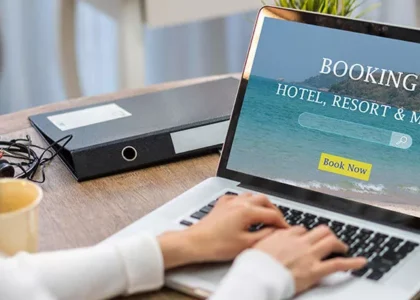In the digital age, the hospitality industry relies heavily on online visibility to attract guests. Whether you’re running a hotel, resort, or vacation rental, search engine optimization (SEO) is key to staying competitive. With millions of travelers searching for accommodations online, a strong SEO strategy can help your business stand out. Here are proven SEO strategies tailored for the hospitality industry to help you rank higher on search engines and attract more bookings.
1. Optimize for Local Search
Most travelers search for accommodations in specific locations, so local SEO is crucial for hospitality businesses. Make sure your business is listed on Google My Business (GMB) with accurate details, such as your address, phone number, website, and operating hours. Include high-quality photos of your property to make your listing more appealing.
Use local keywords like “luxury hotel in Miami” or “beach resort in Bali” throughout your website content, meta descriptions, and titles. Also, encourage satisfied guests to leave positive reviews on Google. High ratings can improve your visibility in local search results and build trust with potential guests.
2. Mobile Optimization is Non-Negotiable

Most travelers use smartphones to search for accommodations and plan their trips. If your website isn’t mobile-friendly, you risk losing potential customers. A mobile-optimized website should load quickly, have an easy-to-navigate interface, and provide seamless booking functionality.
Use Google’s Mobile-Friendly Test to ensure your website meets mobile optimization standards. Additionally, consider implementing Accelerated Mobile Pages (AMP) to improve loading speed and user experience.
3. Leverage High-Quality Content
Content is the backbone of SEO. Create engaging, informative, and keyword-rich content that addresses your audience’s needs. For instance, you could write blog posts on topics like “Top 10 Things to Do in [Your Location],” “Travel Tips for First-Time Visitors to [Your City],” or “The Best Time to Visit [Your Destination].”
Incorporate keywords naturally into your content to avoid keyword stuffing. Use long-tail keywords—phrases that are specific and less competitive—to target travelers with clear intent, such as “pet-friendly hotels in downtown Chicago.”
4. Invest in Visual Content

In the hospitality industry, visuals play a significant role in decision-making. High-quality images and videos of your property can enhance user engagement and boost your SEO rankings. Optimize these visuals by using descriptive file names, adding alt text with relevant keywords, and compressing file sizes to improve loading times.
Consider creating virtual tours of your property or video content showcasing amenities, events, or guest testimonials. These can be shared on your website and social media platforms to drive traffic and improve your online presence.
5. Optimize Your Booking System
A seamless booking experience is essential for converting website visitors into paying guests. Optimize your booking system to be user-friendly, secure, and fast. Ensure your call-to-action (CTA) buttons, such as “Book Now” or “Check Availability,” are prominently displayed and functional on all devices.
Additionally, integrate an SSL certificate to secure your website. Search engines prioritize secure websites, and an SSL certificate reassures users that their personal information is safe.
6. Build Backlinks from Reputable Sources

Backlinks—links from other websites to yours—are a powerful ranking factor in SEO. Focus on building backlinks from reputable sources within the travel and hospitality industry, such as tourism boards, travel blogs, and industry directories.
Collaborate with travel influencers or bloggers to write reviews or feature your property on their platforms. Participate in local events or sponsorships to gain mentions and links from community websites. The more high-quality backlinks you have, the more authoritative your website appears to search engines.
7. Use Schema Markup
Schema markup is a form of microdata that helps search engines understand your website’s content better. For hospitality businesses, using schema markup can highlight important information like room rates, availability, reviews, and amenities in search engine results pages (SERPs).
Adding schema markup can improve your click-through rates by displaying rich snippets. For example, potential guests may see your property’s star rating, price range, or booking options directly in search results.
8. Target Voice Search

With the rise of voice-activated devices like Alexa, Siri, and Google Assistant, optimizing for voice search is becoming increasingly important. Voice searches often involve conversational phrases and questions. For example, a traveler might ask, “What are the best family-friendly hotels near me?”
To capture voice search traffic, focus on natural language and question-based keywords. Create an FAQ section on your website that answers common questions travelers might have about your property or destination.
9. Monitor Analytics and Adjust Strategies
SEO is not a one-time effort; it requires continuous monitoring and adjustments. Use tools like Google Analytics and Google Search Console to track your website’s performance. Monitor metrics like organic traffic, bounce rates, and keyword rankings to identify areas for improvement.
Pay attention to which pages drive the most traffic and bookings. If certain blog posts or landing pages perform well, consider updating them with fresh content or promoting them further.
10. Stay Active on Social Media

While social media doesn’t directly impact SEO rankings, it’s a powerful tool for driving traffic to your website. Share your blog posts, photos, and promotions on platforms like Instagram, Facebook, and Twitter. Engage with your audience by responding to comments and messages promptly.
Encourage guests to tag your business in their posts, and use branded hashtags to increase your visibility. User-generated content can help build trust and attract more potential guests.
Final Thoughts
SEO is an essential part of any successful hospitality business’s marketing strategy. By optimizing for local search, creating high-quality content, improving your website’s user experience, and leveraging social media, you can attract more guests and boost your online visibility. Remember, SEO is a long-term investment, but the results are well worth the effort.
Start implementing these proven strategies today to ensure your hospitality business thrives in an increasingly digital world.



